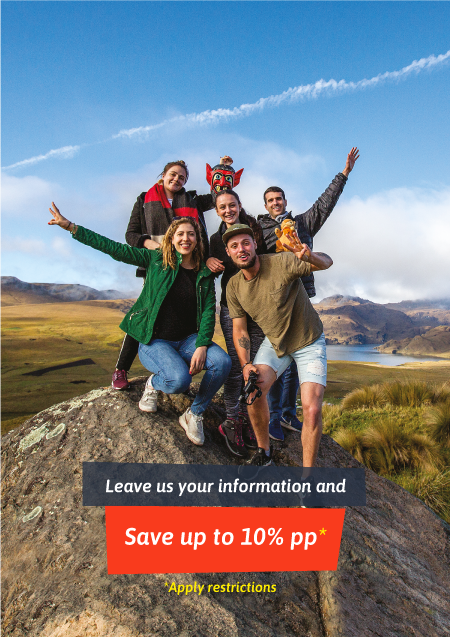Wander With Purpose
Our Social Impact
We believe in bringing travellers into closer contact with Ecuadorians and their ways of life, particularly in rural areas. We believe the Wanderbus can be a force for good in the country.
Back when we began, we made a conscious, deliberate decision to take travellers not only to mainland Ecuador’s ‘famous highlights’ (think Cotopaxi National Park, the Quilotoa crater, Baños, Cuenca…) but also to include remote communities on our routes. We therefore visit the highland lakes and villagers of Ozogoche Alto in Chimborazo Province, a women’s weaving cooperative near Montañita, and the Zambrano family farm in Manabí Province.
This research and development takes time and effort. We visited dozens of options several times before beginning the process of integrating them into our itineraries — which in some cases meant altering routes and timetables in order to include them in our journeys.
Organizing our groups’ visits and ensuring they will be equitable and engaging for everyone, visitor and host, is an integral part of this process. Every day we’re more convinced of the value of these investments and efforts.
We feel hugely proud of what we’ve achieved since beginning our operations in July 2018. We are just as excited about finding more and new ways in which the Wanderbus can have a positive impact across the length and breadth of Ecuador.
We recently embarked on becoming a B Corporation, joining 3,000 companies in over 60 countries that believe in balancing purpose and profit. We are convinced the certification will imbue our company and all our stakeholders with a positive vision of our work and future.
We look forward to sharing this vision, and joining forces with passengers, workers, supply chain partners, our community and wider society over the coming months and years as we strive to make our impact ever-more positive.
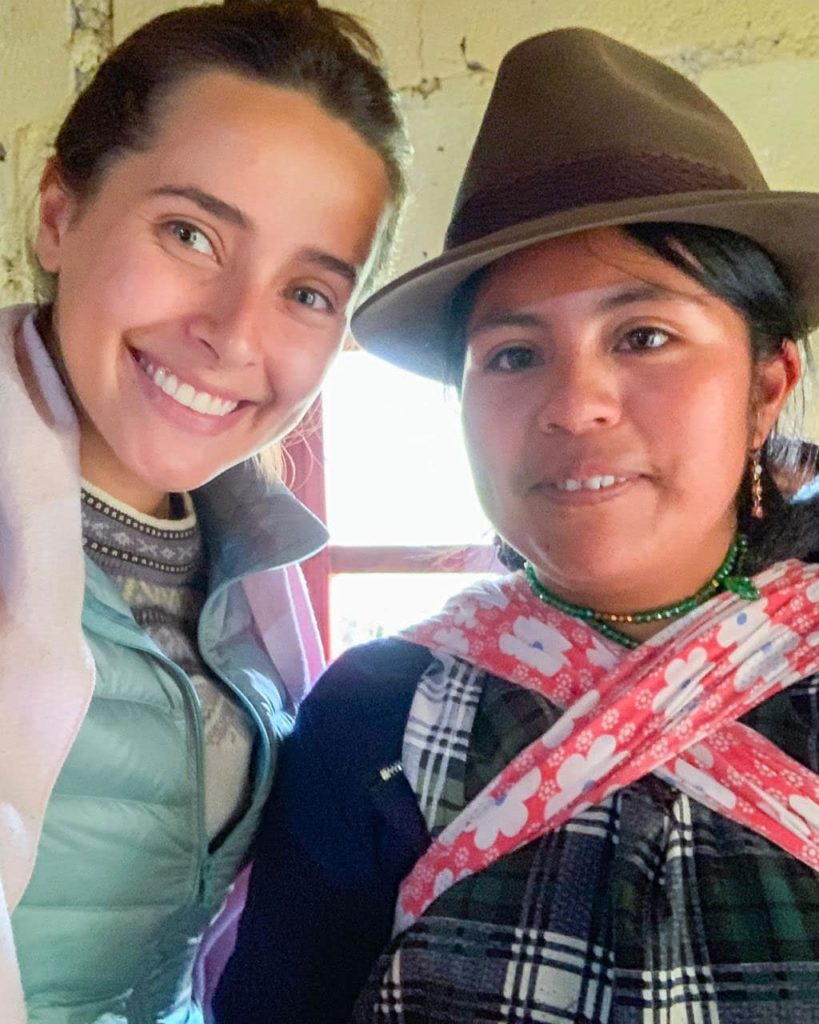
Hand-in-hand
Rural communities in every region in Ecuador face serious challenges when it comes to accessing government support, health, education and basic infrastructure. Their indices for indicators such as infant mortality, child labour, education levels, and women’s equality glaringly illustrate the challenges they face.
Unlike other tour operators who struggle to promise communities regular and significant flows of visitors, the Wanderbus’s routes around the country with a bus capable of carrying 30 travellers allows us to bring constant and continuous numbers to these communities — as well as the stores and restaurants we frequent on our journeys. This makes a huge difference to the impact we can create, the level of trust we can generate and our long-term commitment to our partners.
We firmly believe our presence in rural communities will not only make our service more appealing and interesting to our travellers, but that it can make a lasting impact that goes way beyond us.
By helping the villagers of Ozogoche Alto, for example, to value their Andean culinary heritage and to train them in food and beverage handling, and guiding, the families we work with will tangibly improve their quality of life, and go on to expand their tourism businesses beyond the visits made by Wanderbus passengers.
We look forward to sharing our and their progress on these pages into the future.
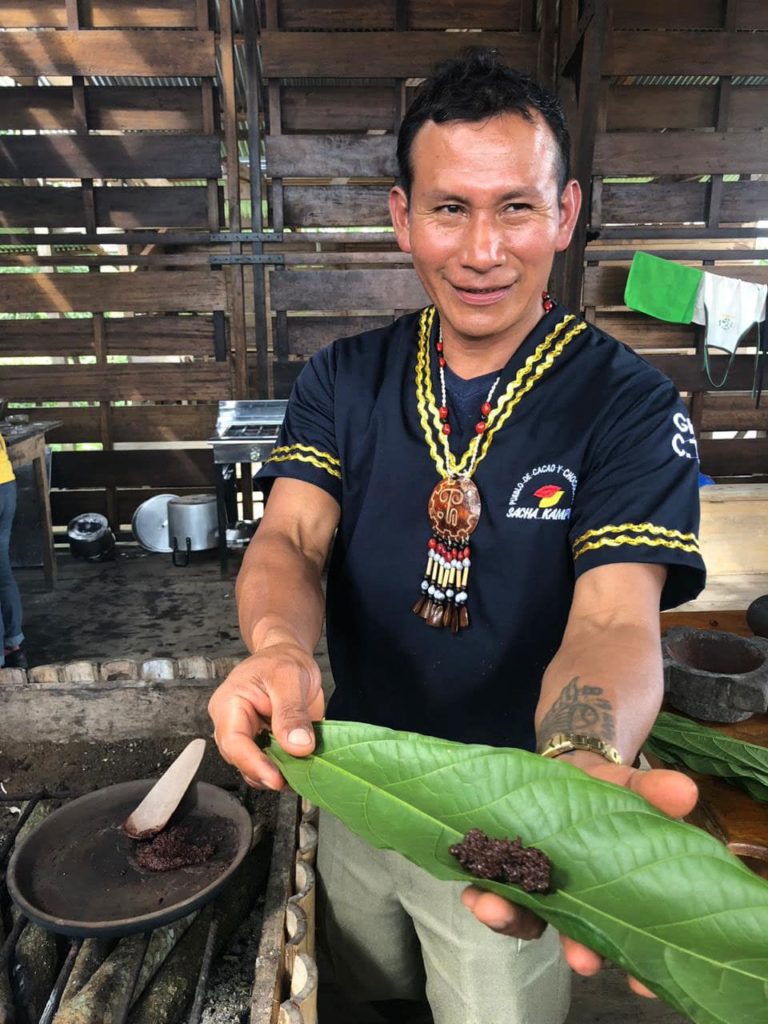
Communities We Currently Work With
Ozogoche Alto, Chimborazo Province
Located in the province of Chimborazo, in the heart of the Ecuadorian Andes, this community of around 60 families makes a living from cattle farming, selling milk and animals. The community was included within the boundaries of Sangay National Park in the 1990s, a situation that, although positive for the conservation of the páramo ecosystem, limits their agricultural and livestock activities. Within this context, we believed it was key to include this community on our Baños to Cuenca route, helping promote the beautiful Andean lake scenery of which they are the guardians to a wider audience, and thereby providing them with a sustainable economic alternative.
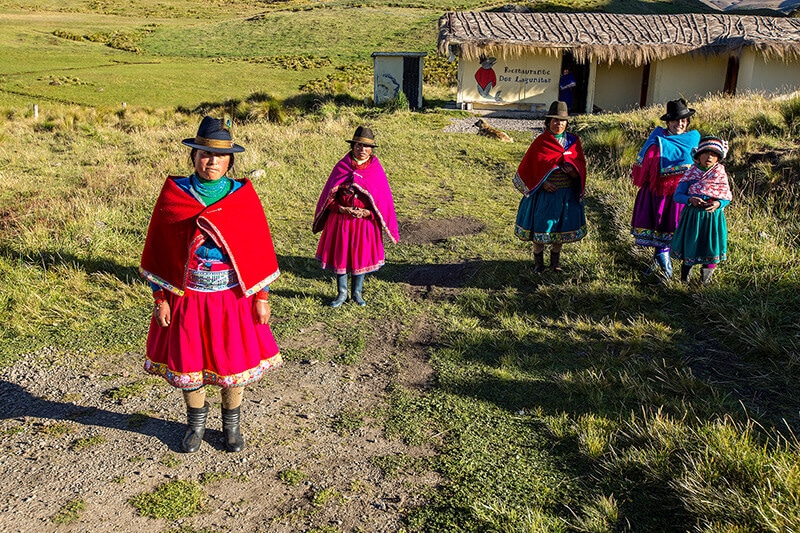
With this context, we believed it was key to include this community on our routes, helping promote the beautiful Andean lake scenery of which they are the guardians to a wider audience, and thereby providing them with a sustainable economic alternative. Since we began working with the community in the summer of 2018, hundreds of travellers have enjoyed their welcome and the incredible Andean landscape of Ozogoche Alto, generating stable incomes for three families.
We have already worked on improving the visitor experience by ensuring that elements of the community’s culture are more evident and assuring that the dishes served incorporate important, and nutritious, Andean ingredients such as potatoes, beans, pulses and lupin beans.
In Ozogoche Alto we are currently working on:
- Improving the infrastructure of the dining room for visitors
- Training the women in food and beverage handling
- Training them on improving their guiding skills
Visit Ozogoche on any of our passes that include the Baños to Cuenca route.
Barcelona, Santa Elena Province
This small town is located in Santa Elena Province, about a twenty-minute drive south of Montañita. It’s one of the key processing sites for paja toquilla straw in the country, the material used to make the famous Panama Hats — which are in fact from Ecuador! The milliners are mainly women, who have organized their own self-governing cooperative which we visit and support.
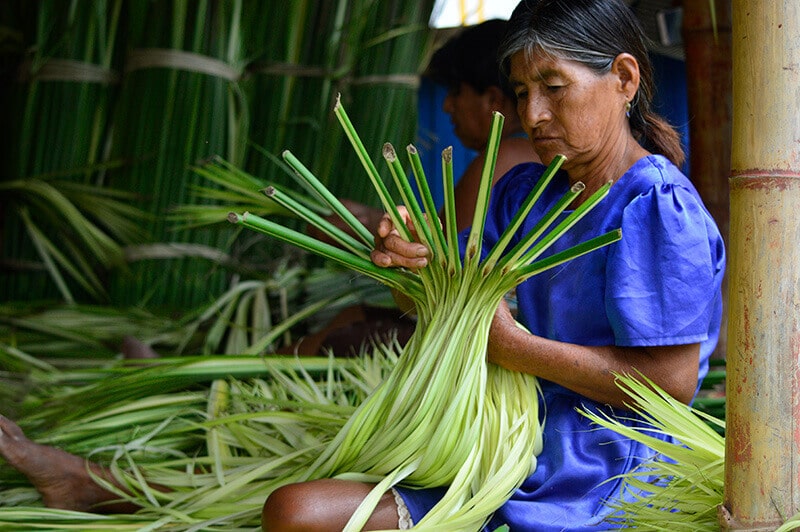
By visiting Barcelona, we want to promote this important traditional Ecuadorian craft and enable the women’s cooperative to sell directly to the consumer, not through intermediaries. Every dollar spent here will directly benefit many families.
Our next steps in our collaborative work with the cooperative are:
- Installing a photo gallery to tell the story of the processing of the straw into hats.
- Seeking to have fair-trade stores in Quito stock the organization’s products.
Visit Barcelona on any of our passes that include the Cuenca to Montañita route.
Mate de la Fortuna, Manabí
In order to help travellers experience the rich and varied lands and produce of Manabí Province, we visit the Zambrano family near Chone, who show us their agro-forestry organic farm and share their secrets for preparing a delicious tonga, a traditional plantain-based dish, for lunch. Although we have only been working with the Zambrano family since April 2019, we can already feel the many ways in which our visits are having a positive impact.
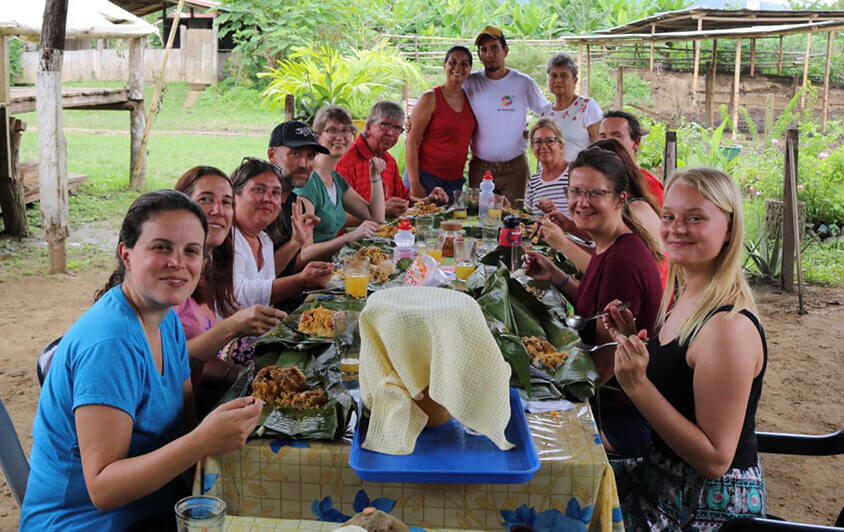
The Ecuadorian coastal province of Manabí is one of the most celebrated when it comes to cuisine. Cocina Manabita is highly-regarded for its varied ingredients and delicious flavours (which include green plantains, ripe plantains, fish, crabs, manioc, peanuts, lemon and coconuts) that Manabas prepare and combine in mouth-watering ways. In order to help travellers to experience these delights and local life first-hand, the Wanderbus visits the Zambrano family, who show us their agro-forestry, organic farm and share their secrets for preparing a delicious tonga, a traditional plantain-based dish, for lunch.
Although we have only been working with the Zambrano family for a few months, we can already feel the positive impact our visit is producing, helping them (and two more neighbouring families who assist them) to earn additional income. We have also agreed to transport their organic agricultural produce (think piles of bananas, plantains, pineapples, fruits, yucca..!) on the bus up to Quito for free, enabling them to negotiate better prices.
Our next objectives in supporting this family are:
- Help them to find funds to rebuild the bridge that connects their farm with the outside world (it was damaged in the rainy season of 2019).
- Training for building ecological bathrooms
- Create a modest store for the family to sell crafts and traditional sweets from the region to visitors.
Visit Mate de la Fortuna on any of our passes that include the Montañita to Quito route.
